We recently posed as a gullible recruit and let a scammer sucker us so we could learn their tricks.
But it’s a trick.
The person you’re talking to isn’t who they claim to be.

You’re talking to a scammer pretending to be a real employee.
Here’s How the Scam Starts
Fake job recruiters don’t just contact you out of nowhere.
These scammers contact people who’ve posted resumes online looking for a job.

The company offered John a variety of positions from Customer Service and Data Entry Clerk to Accounting Executive.
Despite his resume with a background in IT, he applied for a customer service position.
The interview just kept getting better and better.
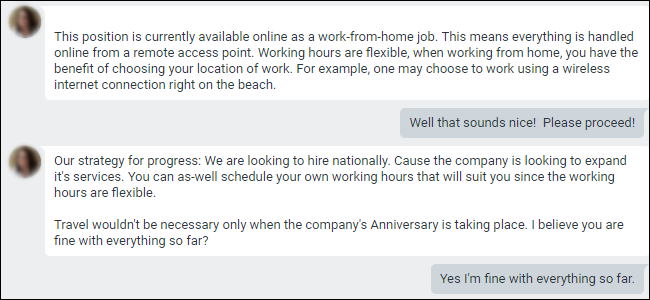
The job is a work from home position that paid $40 an hour—full time with benefits!
Sounds legit to us!
Completely standard questions that you’d expect in any job interview, right?
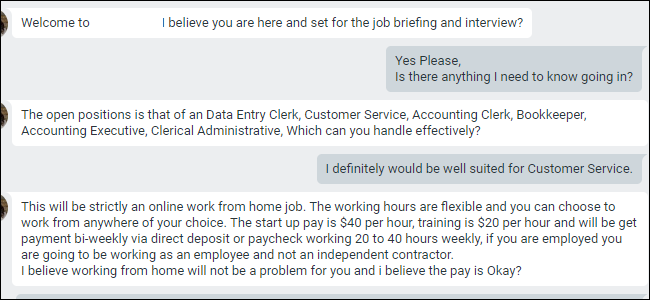
Our intrepid young job seeker had mixed feelings at this point.
On the other hand, he’d already received a promotion!
After all, he applied for customer service and now had a position in Project Management.
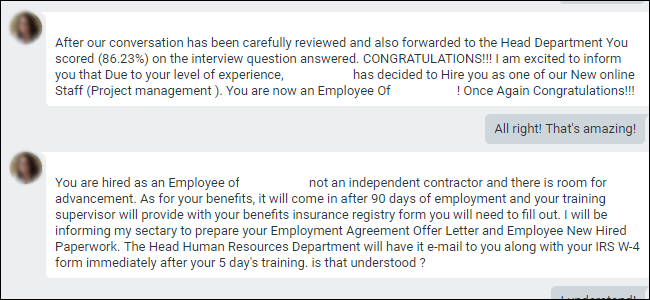
Identification makes some amount of sense, but why would any job need an IMEI number?
In the meantime, John sent them the offer letter—with a slight addition.
And fortunately, they didn’t!
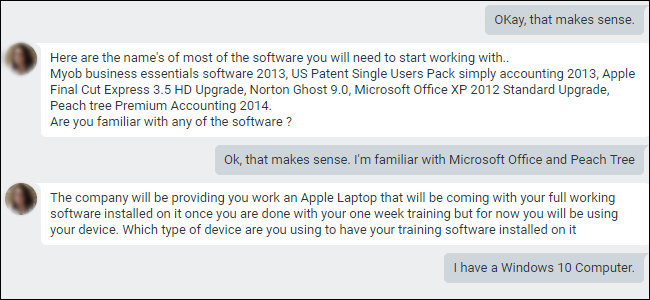
His training couldn’t start because his phone was incompatible with the training apps.
They “won’t remotely install.”
And there’s only one phone that will do.

An “iPhone Max with the largest hard drive and latest iOS.”
Nothing less will do.
Sensing his newfound job was in danger, John felt immediate relief when the recruiter offered a suggestion.
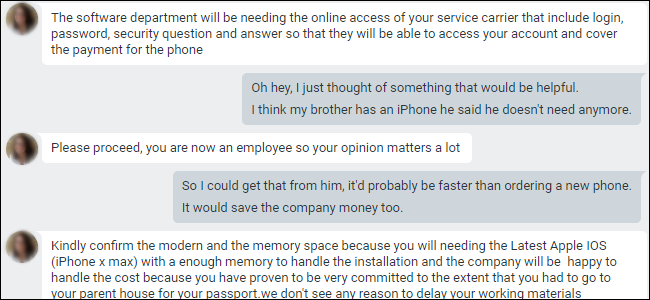
John could provide the username, password, and security questions to his cellular carrier’s online portal.
Isn’t that nice?
Just what you’d expect from a legitimate company!

He didn’t want it because, uh, reasons.
The recruiter said this would be perfect.
Well, that doesn’t look like a large company headquarters.

Maybe the offices are underground?
Some digging into the address revealed that a trustee currently owns this house, so likely it’s vacant.
That’s the perfect target for this scam.
They even asked John for a picture of the box so they’d know what to look for.
Of course, we never sent the package.
Several days later, the scammer is still asking for it.
John insists he sent the package, but his new employer doesn’t believe him.
The scammer said John never sent it and he knows—but that’s okay, he forgives John.
You pay for the phones, of course.
That’s bad enough, but this could have gone a different way.
With all that information, they could easily steal your identity.
But it’s possible you have friends and family who don’t so talk with them.
Let them know the red flags.
A few simple rules go a long way:
Companies don’t hire through Google Hangouts or text messaging.
U.S.-based HR recruiters are most likely going to speak excellent English.
Throughout my contact with this scammer, I noticed they spoke English at a competent level.
Their language capability didn’t match up to the profile of the person I found on LinkedIn.
But it should ring a warning bell for you.
Legitimate companies won’t ask you to pay anything to start a job.
Your employer pays you; you don’t pay your employer.
It’s a trap.
Finally, if it sounds too good to be true, then it probably isn’t true.
Look into similar positions at similar companies.
Does the position make sense?
Does the pay make sense?
Ask these sort of questions.
If you ever encounter a scam like this, you should do the same.
Because the scammer contacted us through Google Hangouts, we also reported this scam to Google.
Unfortunately, several days later, the scammer still appeared online on Google Hangouts.
We’re disappointed Google isn’t promptly acting on reports of fraud on its platform.